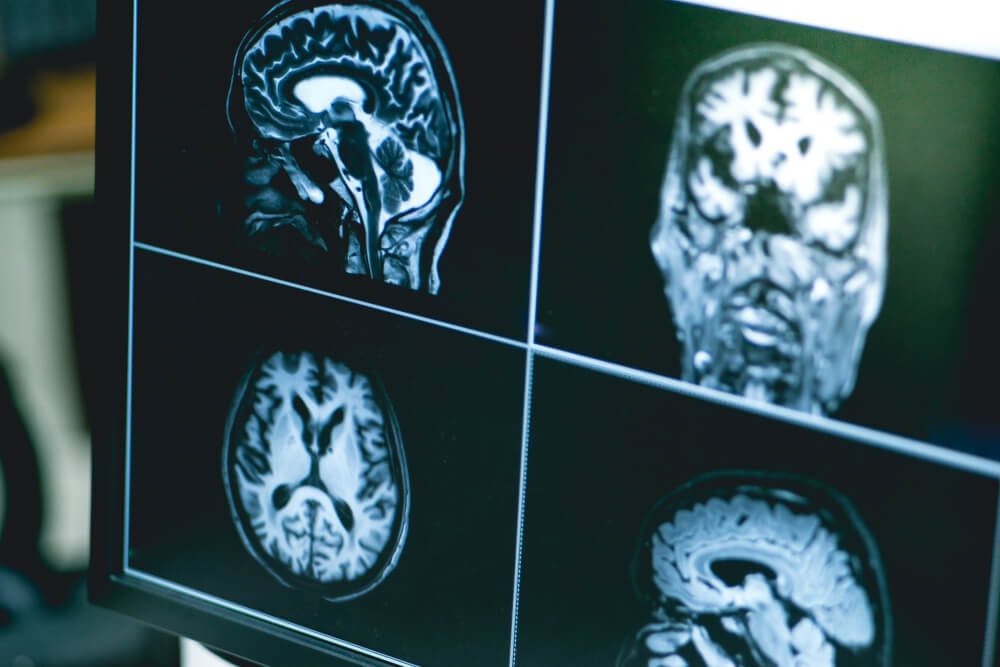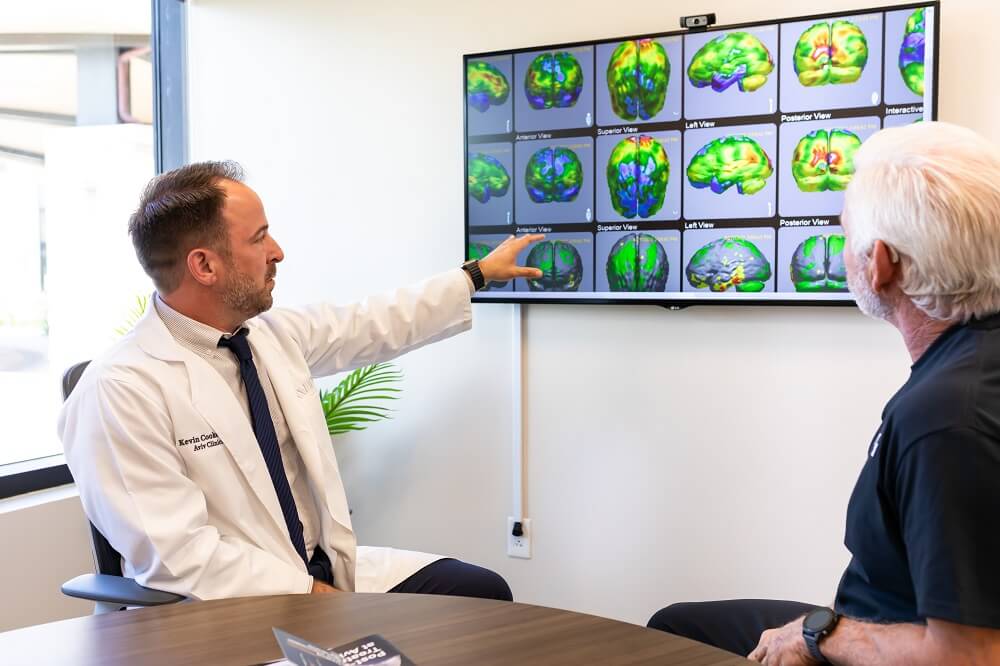
The Early Stages of Dementia: Recognizing the Signs and Reducing the Risk


We all experience bouts of forgetfulness occasionally, even at a young age. You might misplace keys, struggle to recall a name, or walk into a room and forget why. These moments are usually harmless. Maybe you didn’t drink your morning coffee or slept poorly the night before. But for some, these lapses can signal the early stages of dementia, a progressive condition that affects thinking, memory, and decision-making.
Recognizing the early signs of dementia in yourself or a loved one is critical. Early awareness not only allows you to take proactive steps to reduce risk and preserve cognitive function, but it also opens the door to interventions and programs designed to support brain health. With the right knowledge and guidance, you can navigate the changes with confidence and clarity.
<hr />
In this article:
<hr />
What Is Dementia? Understanding Cognitive Decline and Early Symptoms
Dementia is a progressive condition that impairs memory, thinking, and reasoning. It can affect daily life, even in the early stages, and is caused by a variety of neurological diseases.
“More than 55 million people” in the world live with dementia. In the U.S., “experts report more than 7 million people ages 65 or older had dementia in 2020.”
Remember, dementia isn’t a single disease. Instead, it’s a general term covering a range of specific medical conditions. Keep reading to learn more.
Early Signs of Dementia: What to Look For
Common early signs of dementia include memory lapses, trouble concentrating, confusion with daily tasks, mood changes, and language difficulties. Recognizing these signs early is critical for intervention.
- Memory lapses: Someone might be unable to recall events or frequently loses items around the home.
- Trouble concentrating or focusing: Struggling to make complex decisions, plan events, or solve problems are a few common ways this can manifest.
- Confusion surrounding typical daily routines: Activities like paying bills or navigating a drive home from the grocery store might be more challenging than usual.
- Mood changes: Depression, anger, or irritability can become more frequent. An individual can feel more withdrawn and lose interest in hobbies and people who used to bring them joy.
- Language/communication roadblocks: A person might have trouble grasping the right word or phrase or have wandering thoughts during conversation.
- Instances of disorientation: An individual can no longer recognize where they are or how they got there.
Read about the signs and symptoms of cognitive decline>>

Early Onset Dementia Diagnosis: How Doctors Identify Symptoms
As every individual is different and no specific test confirms dementia. Instead, a comprehensive evaluation is required. The assessment might involve various medical exams like cognitive tests and brain imaging.
Early detection is critical to getting the help you need to thoroughly prepare following your diagnosis.

Types of Dementia: Alzheimer’s, Frontotemporal, Lewy Body, and Vascular
Dementia is an umbrella term for conditions like Alzheimer’s, frontotemporal, Lewy body, and vascular dementia. Each type presents unique early symptoms and requires different approaches to care.
Alzheimer’s Disease: Recognizing Early Cognitive Changes
Alzheimer’s disease often begins with subtle memory problems and difficulty with language or decision-making. Early recognition can help slow progression and improve quality of life.
While the exact cause of Alzheimer’s disease is still unknown, researchers note that the “build-up of proteins in and around brain cells” is a possibility.
Are You At Risk of Developing Alzheimer’s Disease?
Learn how a simple blood test available at Aviv Clinics may be able to answer this question: pTau Testing
Initially, Alzheimer’s impacts the nerve cells controlling memory, language, and conscious thought. Damage then progresses to parts of the brain that manage reasoning and social behavior.
These changes are not always apparent, especially not in the earliest stages. Alzheimer’s can develop for 15 to 20 years before symptoms start to appear. Currently, it’s estimated that “6.2 million Americans” live with the disease.

Frontotemporal Dementia: Symptoms and Early Indicators
Frontotemporal dementia affects the frontal and temporal lobes, leading to changes in behavior, emotion, and communication. Early detection is essential for planning care and support.
You may have heard of FTD when the press announced actor Bruce Willis’ diagnosis in 2022.
Symptoms include the following:
- Unusual behaviors
- Emotional problems
- Trouble communicating
- Difficulty with work
- Challenges with walking
A classic example of the impact of damage to the frontotemporal lobe involves a railroad construction worker from the 1800s named Phineas Gage, who is now considered the first patient in the history of neuroscience. While working on the railroad, Gage suffered an accident in which a large iron rod penetrated his skull and frontal lobe, causing brain damage. Although not an example of dementia, Gage’s case offers insight into the importance of the frontal lobe and the functions it controls.
Gage survived the incident, but his demeanor and personality changed completely. Previously known as a pleasant, hard-working “gentle giant,” he became, according to Dr. John Martyn Harlow, “…fitful, irreverent, indulging at times in the grossest profanity, manifesting but little deference for his fellows.”
Unlike Gage’s sudden change due to injury, the impacts of frontotemporal dementia develop gradually. The condition tends to strike individuals at a younger age than other forms of dementia. ”Roughly 60% of people with FTD are 45 to 64 years old.”
Lewy Body Dementia: How Early Symptoms Affect Daily Life
Lewy body dementia is caused by protein deposits in the brain and can produce hallucinations, mood changes, and movement difficulties. Early signs may be mistaken for other conditions.
Many learned about Lewy body dementia (LBD) when it was revealed actor/comedian Robin Williams had suffered from the disease. LBD arises from abnormal deposits of a protein called alpha-synuclein in the brain.
These deposits, named “Lewy bodies,” affect brain chemicals, leading to problems with thinking, movement, behavior, and mood. Williams’ struggle with depression was likely a direct result of the chemical changes instigated by LBD.
LBD worsens over time but impacts certain individuals more severely than others. One challenge in diagnosing LBD is that it mimics indications of other brain diseases or psychiatric disorders.
Vascular Dementia: Causes, Symptoms, and Risk Factors
Vascular dementia results from reduced blood flow to the brain. Early symptoms can include memory issues, confusion, and trouble with problem-solving. Managing cardiovascular health may reduce risk.
When blood and oxygen flow to the brain is interrupted, it can cause changes in memory, thinking, and behavior. The size, location, and number of vascular changes dictate how severe vascular dementia is on a person’s cognitive function.
For example, someone who has suffered a major stroke may experience damage. But so might someone who has had multiple small strokes over time.
Growing research investigates the connection between cardiovascular disease (heart attack, stroke) and cerebrovascular disease (blood flow/vessel conditions) and its impact on cognitive impairment and dementia.
That said, not everyone who experiences a heart attack or stroke will develop dementia. The aging process can also contribute to the development of vascular dementia. The body simply loses its ability to deliver blood as efficiently as it once could.
Mixed Dementia and Other Neurological Conditions
If someone has characteristics of two or more types of dementia, they may receive a diagnosis of “mixed dementia.” Other neurological conditions can lead to symptoms of dementia, such as:
- Creutzfeldt-Jakob Disease (CJD): This rare, degenerative, fatal brain disorder causes problems with muscle coordination, personality changes (including progressive and impaired thinking and judgment), and vision problems that may lead to blindness and involuntary muscle jerks. Individuals with CJD lose their ability to speak and move, eventually slipping into a coma.
- HIV-Associated Dementia: While less of a problem now that the medical community has curbed the AIDS epidemic, HIV-associated dementia can cause behavioral changes and a gradual decline in cognitive function.
- Huntington’s Disease: This inherited disease eventually leads to brain cell death and resulting complications. HD may cause changes in behavior, emotion, judgment, and cognitive function.
Other Conditions That Mimic Early Dementia Symptoms
If you or a loved one experiences dementia-like symptoms, it doesn’t necessarily mean a dementia diagnosis is forthcoming.
Other factors may lead to dementia-like symptoms. For example:
- Even a minor medical issue, like a urinary tract infection (UTI), can lead to confusion or delirium in older adults.
- If someone doesn’t adhere to their blood sugar medication and their glucose levels drop, they may experience similar symptoms.
- Medication interactions (or medication/supplement interactions) may mimic symptoms of dementia.
That’s why it’s essential for anyone taking medications or supplements to inform their doctor and pharmacist.
Have you noticed changes in your memory, attention, or thinking skills?
Download our free e-book, “What’s Happening to My Brain?” to learn how you can improve your brain health and cognitive vitality at any age.

Early Detection of Dementia: Steps to Reduce Your Risk
Unfortunately, there’s currently no cure for dementia. Medications have been employed to slow the progression of dementia, but with little success.
While there’s no standard early dementia onset treatment, there are steps you can take to optimize your health and reduce dementia risk:
- Engage in cognitive stimulation activities: Just like any other muscle in the body, your brain needs regular exercise to function at optimal levels. Learn something new or dive into brain games like crossword puzzles or sudoku. The Aviv Medical Program employs cognitive training and exercises for clients who want to improve their brain health.
- Maintain an active lifestyle and a healthy weight: This includes sticking to a balanced diet like the MIND diet, engaging in physical activity you enjoy, and abstaining from smoking, drug use, and excessive alcohol consumption. Physiotherapy and nutrition counseling are also elements that can be included in the personalized Aviv Medical Program, because these healthy habits can also help manage diabetes, blood pressure, cholesterol, and other chronic conditions.
- Social engagement: Social activities may “reduce the risk of dementia due to mental and intellectual stimulation.” Take time to see loved ones and engage in leisurely activities with them.
- Art and music therapy: Art and music therapy can elicit emotions, memories, and a sense of calm—all of which may “reduce cognitive decline” and enhance the quality of life.
- Pet therapy: The link between individuals and animals holds powerful benefits like increased self-esteem and can “[improve] cognitive performance such as memory or concentration, motor skills and quality of life.”
- Reminiscence therapy: By using all senses (sight, touch, taste, smell, and sound), reminiscence therapy encourages people to remember specific events, individuals, and places. This therapy can help people gain confidence in their cognitive abilities and allows them to reflect upon what holds meaning for them.

Taking Action in the Early Stages of Dementia
If you or a loved one is noticing changes in memory, focus, or daily functioning, don’t wait to seek guidance. Early detection and intervention are key to slowing cognitive decline and improving quality of life
Groundbreaking research is bringing scientists one step closer to minimizing age-related cognitive decline, especially related to the early stages of dementia. In a test group, patients in this landmark study experienced improved cognitive functions, including memory recall, concentration, and response times.
A health plan based on this unique protocol is now available at Aviv Clinics in central Florida. The Aviv Medical Program offers a personalized, evidence-based approach to cognitive health. Using advanced assessments and tailored interventions like as cognitive training, physical activity, nutrition counseling, and hyperbaric oxygen therapy, Aviv helps individuals in the early stages of dementia optimize brain performance and resilience.
Take the first step today. Schedule a consultation with one of our board-certified physicians and learn how a tailored plan can help protect and strengthen your brain.
Last Update: October 6, 2025




